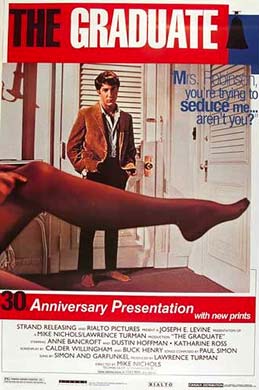Friday, December 9, 2011
MY PLE!
Although all were helpful in my quest for knowledge pertaining to the accuracy of my film blogs,
essays, and other evaluations referencing films, the most helpful sites out of all of these
happened to be: http://www.imdb.com/ , and http://www.rottentomatoes.com/#. I would also
be remiss if I did not thank Wikipedia for all of its amazing, exhaustive information on directors
and actors of the films we as a class concentrated on this semester.
Also, I would like to add Youtube.com to my list of useful sources. Some of these film reviewers
were, honestly, some of my biggest inspirations during this class. Thank you Youtube!
Short History of Film was an amazing, amazing class to be a part of.
Thank you!
-Lizzy Place
Tuesday, December 6, 2011
"New Hollywood"

What defines “New Hollywood”? Is it the ground-breaking films that succeeded in making it to the big screen, or the underground “Indy” films that influenced the more well-renowned yet society-changing, stirring films that we are all so familiar with to this day? It is indeed more common to refer to the more famous, and more prominent films in relation to “New Hollywood”. Although films such as The Graduate and My Fair Lady influenced many filmmakers after their introduction to the big screen, these films were not the first of their kind; they were derived and inspired by books, and less recognized films, even the stage! "New Hollywood" is what Hollywood became in the early 1960s,which gradually became more prevalent in film and television after the first, for lack of a better word, "scandalous" big screen hits came out.

"New Hollywood" is easily defined as the most influential and what are the most notable films in history; films that changed forever the way Hollywood was viewed forever. The graduate is a fantastic example of this particular occurrence; Benjamin Braddock (played by the much respected and immensely talented actor, Dustin Hoffman)
portrays a young man who has just graduated from college. He is confronted with feelings of... well, frankly, numbness and huge disappointment. In an effort to possibly conquer the debilitating sense of emptiness, loneliness, and just pure boredom, Benjamin Braddock has a shocking affair with a married woman named Mrs. Robinson. The entirety of the film, "The Graduate", is dedicated to documenting the emptiness and hollowness young newly graduated college students commonly experience. Although it is very particular of the time in which it was based, the film was a mildly unheard of, honest representation of life. Quite a gigantic step out of the closet for Hollywood (or shall I say, "New Hollywood")

Hollywood started as a prudish, conservative setting and transformed into what we all recognize as the daring and controversial scene of the "new age" of film. As we as a society have grown, the big screen has reflected that growth. As we have become more accepting, more adventurous, and possibly more imaginative, so have movies. Specifically, "New Hollywood" came into existence just as directors, writers, and actors decided that they wanted film to reflect the society they lived in. Previous to "New Hollywood", films were a sort of fiction... going to the Theater was similar to looking through a window into a different, more perfect world, whereas Post-"New Hollywood" going to the movies can be, at times, just as familiar as looking into a mirror.

-Bonnie and Clyde (another great representation of a film that transformed "old Hollywood" to the "New")
Bonnie and Clyde, with its unique camera angling styles and trans formative plot lines and script technique, changed a generation of filmmaker's methods and standards for good filmmaking forever. There can be no denying the impact that Bonnie and Clyde had on "New Hollywood". Credit must be given to these, and many other films such as: Heaven's Gate, One from the Heart, Psycho, Look who's Coming to Dinner, and uncountable others to the existence of what we now call Hollywood.
-CriticNeutral
(a.k.a. Elizabeth Place)